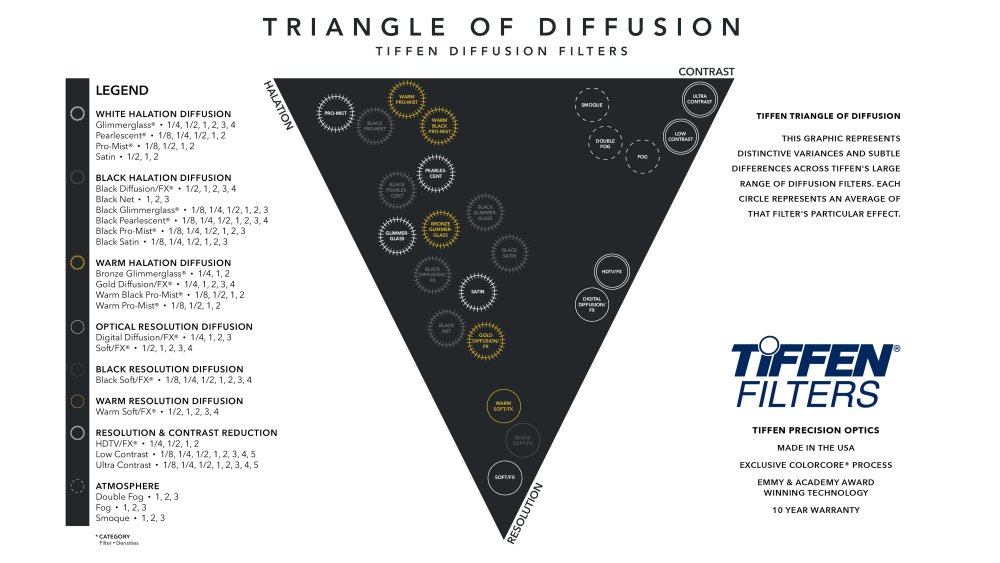-
Posts
164 -
Joined
-
Last visited
Content Type
Profiles
Forums
Articles
Everything posted by Benjamin Hilton
-
I think you're misunderstanding me. By downgrade I mean it technically achieves its look from introducing artifacts. Generally softer resolution, stretched flaring, squished bokeh and so forth. Now it is a really desirable look to many people, but that often is the affect of tastefully introducing artifacting or "downgrading" an image. I used the terminology in response to zlfan's original post when he said that anamorphic was created to increase the resolution of an image. Just pointing out that it in fact does the opposite. That's not a bad thing, in fact it can be quite good. Personally I'm not a huge fan overall, but there are cases when I think it's been used quite nicely.
-
I'm totally serious on this forum. I get what you are saying here, we totally need to know what we are getting into with our gear before making purchases. From your original post though, I got the impression that you were wanting to know the little 1-3% differences in actual sensor usability effected by stabilization and such. To me I'm baffled by why that would make any real world difference to anyone. Wasn't trying to be mean or anything, just was truly curious. These days I do my best to try to rent for a day before making a purchase, there is nothing like a little personal quality time with a camera to see if it will work for my workflow.
-
I would strongly discourage trying the ZV E1 for a shoot like this, too many usability issues. The FX30 is a fantastic camera for what you are trying to do. I don't have experience with the C200, but I can attest that the FX30 should meet all of your expectations. Good usability, great autofocus, plus all the other stuff you would want in a camera. Also don't forget that rental is an option, might be able to save a lot of money that way, or put your money into a really nice lens or two
-
Can I ask why it matters to you?
-
Anamorphic is just a look, take it or leave it. Technically anamorphic lenses tend to "downgrade" the footage resolution wise. Does that actually matter? No, not in the least tiniest bit. It can really add to the story on some projects, and semi ruin it on other ones. I'm not the biggest fan personally.
-
Honestly cameras haven't been the differentiators for quite some time on productions. Good productions generally just require a lot of money and talent (unless you are into micro budget stuff) and cameras have always been one of the cheapest things on the budget list.
-
I don't think camera has anything to do with it. DPs pick the look for the show with the director before the camera is chosen. They then pick the camera that makes sense for their workflow, and build an image pipeline with the exposure values, lenses, lighting choices, luts from the colorist or DIT and so forth.
-
Are you talking about real doc work? Or narrative stuff. Because in my experience in the doc world, lighting has to be very selective. Of course I'm lighting interviews, and anything I can. But in the world of fast moving subjects and spur of the moment things happening, it is so incredibly handy to have a camera I can crank up the ISO and get a decent image when the character is only lit by the light on the stove, or the dash lights in their car, or the stars in the desert. I totally get it that knowing how to light is much more important than having high ISO, but that doesn't negate how important it can be for doc work. I guess this all totally depends on the use case though.
-
This is true to a certain extent, but in doc work low light ability still can be very important. I've had to shoot a lot of stuff that happened so fast or spontaneously, or was outright just too dangerous to be lit. The nice part about having a camera that can do low light is it enables you to work with your setups quicker.
-
What's price bracket are you trying to stay in? If you could afford it the Sony FX6 is my favorite camera for doc work. Great overall image and camera handling, but also amazing low light capability. If that's too pricy the FX3 or A7Siii are also great options, similar image just in a DSLR body. The only major image difference between those and the FX6 is the inability to turn off the noise reduction which can be kind of a pain if that bothers you. Really most full frame cameras these days though can handle basic low light no problem, especially when paired with F1.8 lenses.
-
It's probably going to be a small margin for sure for feature films and commercial work. What will probably keep the "real filmmaking" industry alive will be documentary and reality show content. That will be the authenticity people will come back to.
-
This is why log exists. We capture a dynamic range the screens can't display, then squeeze it into a rec 709 image that works for the screen and retains the detail we need for the shot
-
I think the problem with some of these discussions is the fact that we argue about gear like we are using it for the same purposes. We are discussing the merits of specific trucks, only some of us are using the trucks for a country drive to church, and some of us are hauling loads cross country. This makes the conversations very frustrating. You can take a drive with an 8 stop DR GH1 and get some pretty shots of the trees at sunset and feel the wind in your hair. But have you ever tried to shoot a commercial project or a modern documentary with 8 stops of DR and be competitive in today's market?
-
Yeah my point exactly. I have very little doubt AI will take over huge swaths of the market, it's just I think there will always be room for human made products.
-
I think there is no doubt a lot of content will eventually be dominated by AI. That being said, I think the human craving for authenticity and reality will never be completely dead. Just look at the amount of photographers and cinematographers returning to analogue film. While it may become niche, I think there will always be space for movies filmed with "real people" on "real cameras."
-
This chart from Tiffen is really helpful for filter experimentation. Glimmer glass is the filter I reach for the most because it slightly softens the image just a touch, while also blooming practical lights a little bit too without touching the shadows or overall contrast. When pared with modern sensors it is a really pleasing look.
-
This partly true. Many pros will also come up with a lens/camera/filter combo that matches the look they want for a specific project, then stick with that combo all the way through. They then will add specific filters for specific shots. It's what I see done a lot anyway.
-
I don't think so.
-
This is true. The more experimental features of the mirrorless cameras will be the norm in cinema cameras.
-
Too true. Arri targets the feature film and commercial industry. Those industries have absolutely no incentive to use BM or anything cheaper. The rental cost of an Arri is one of the smallest line items in their budgets. Why would they experiment with something that saves a few bucks on the rental when they have years of experience, trust, rigging etc all geared around their usuals cameras of choice? You technically could shoot a movie with a BM camera or an FX30 or a bunch of other cameras, but why would you unless you need something small for a specific shot? It's like saying your such and such street car can go the same speed on a drag strip as an F1 car so they're going to dominate the F1 industry here pretty soon. Um, no. Why would they?
-
It depends on what you want to do with them of course. For me personally, the GH5 was kind of the 5d mkii of the photography world. It was the marker when image quality hit the "good enough" metric. For most work, shooting with the GH4 will still be a frustrating experience image wise. Not to say it can't produce good images, it's just very limited compared to modern alternatives. The GH5 was where cameras really hit a "I can get 75% of what a 2024 camera can get most of the time" kind of reality. That being said, if your standard is low and you are just looking for a sharp image and some basically decent color, the GH4 will be fine.
-
Glimmer Glass is my personal favorite. I also use the Tiffen Smoque for some interview setups when I have a practical source in the frame
-
I'm not addicted. I keep a casual eye on the industry purely out of interest. It's work for me, but also a hobby.
-
Makes sense to me





